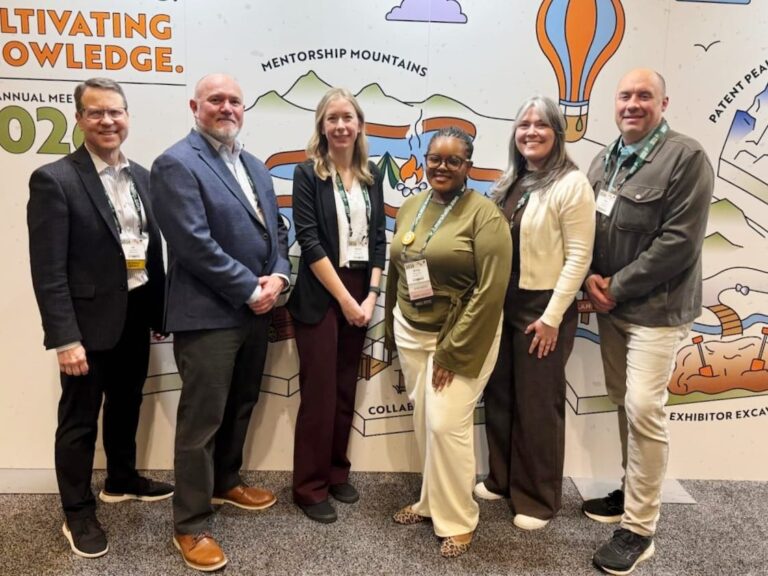
BioVentures at the AUTM Annual Meeting 2026
From February 8 to 11, the BioVentures team attended the 2026 AUTM Annual Meeting in Seattle to connect with peers, explore opportunities, and strengthen partnerships.

From February 8 to 11, the BioVentures team attended the 2026 AUTM Annual Meeting in Seattle to connect with peers, explore opportunities, and strengthen partnerships.
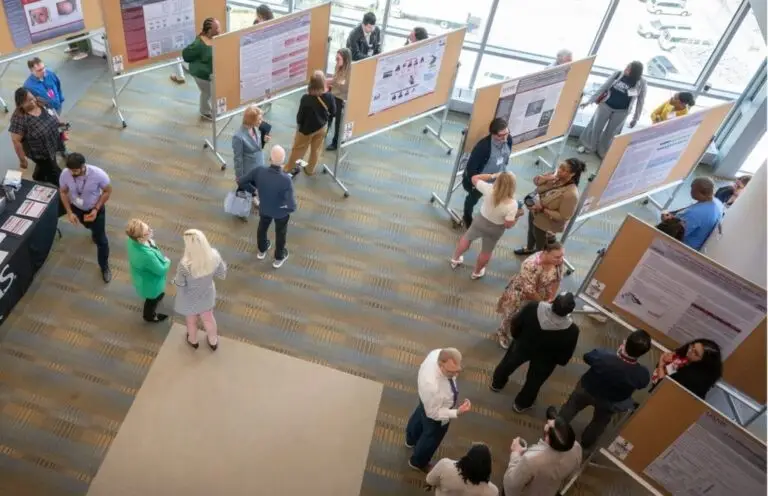
BioVentures will be present at the Translational Research Institute (TRI) Research Expo 2025, taking place Wednesday, September 10, from 4:00 to 6:00 p.m. CDT at the Reynolds Institute on Aging, First Floor. The Expo brings together more than 50 research services across UAMS, providing investigators with the opportunity to explore resources, build connections, and learn about available support for advancing their work. Visitors can stop by the BioVentures table to discuss invention disclosures, licensing, commercialization pathways, and opportunities to bring biomedical innovations to market. Don’t miss the chance to connect with colleagues, enjoy refreshments, and learn how BioVentures can support your research journey. 👉 Register here
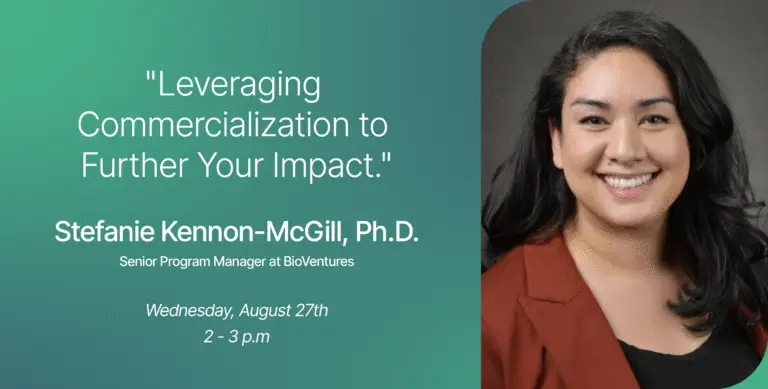
Stefanie Kennon-McGill, Ph.D., Senior Program Manager at BioVentures LLC, will be the featured speaker at 2 p.m. Wednesday, August 27, for the Health Sciences Entrepreneurship Grand Rounds. The topic will be “Leveraging Commercialization to Further Your Impact.” Join us at the Winthrop P. Rockefeller Cancer Institute, 10th Floor, Betsy Blass Conference Room. The UAMS community and public are welcome to attend.
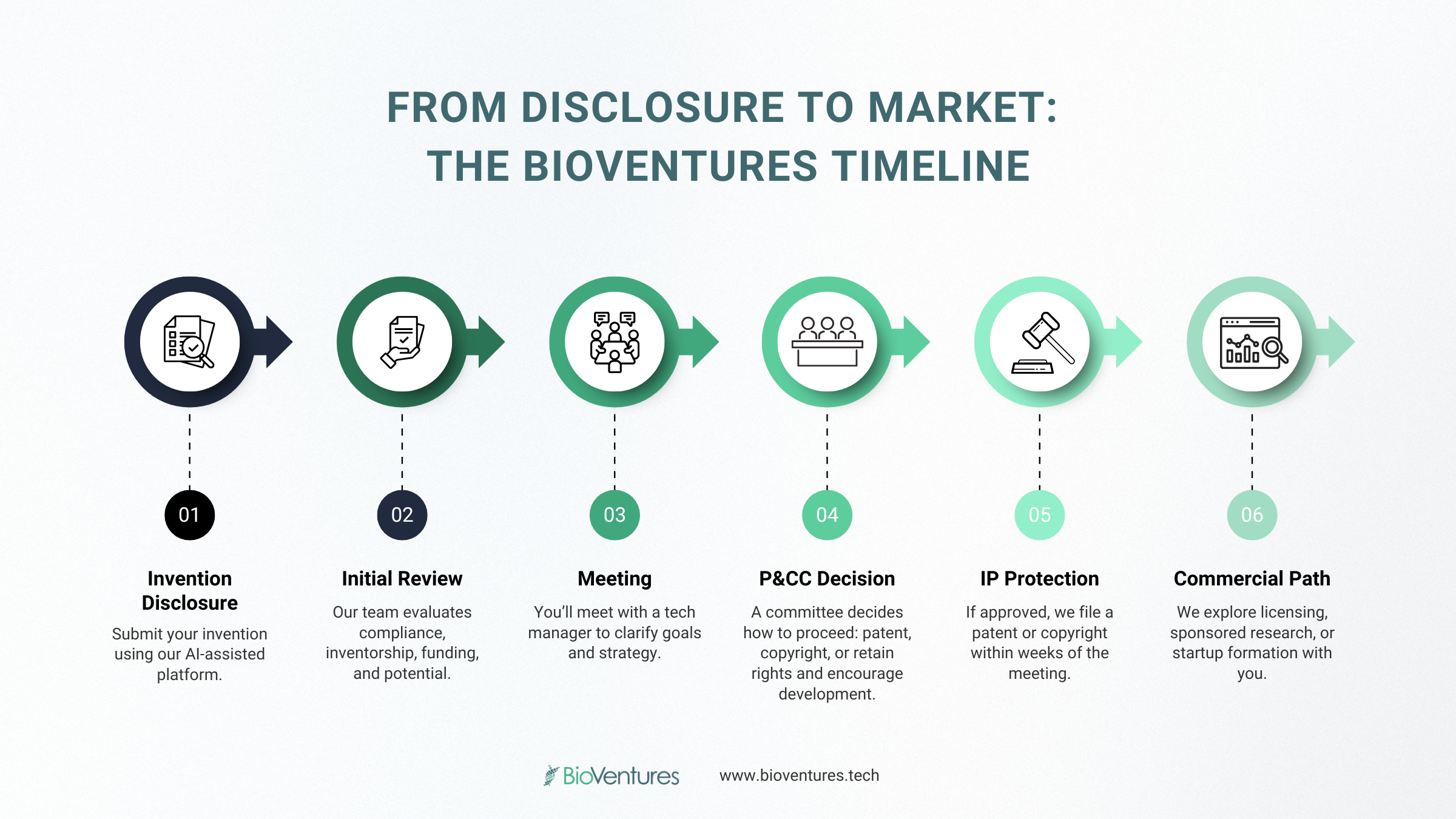
Curious how an idea becomes a protected invention at UAMS? At BioVentures, we guide innovators through every step, from disclosure to patent decisions and market strategy. Here’s how the process works, what to expect, and how we support you along the way. 1) Submit Your Invention Disclosure The first step is fully and adequately disclosing your invention to BioVentures by submitting an invention disclosure. Even if you’ve already reached out to schedule a meeting, we require a disclosure to initiate the process. It allows us to review the technology in advance, and gather essential information on compliance, funding, and inventorship. We’ve recently adopted a new AI-powered disclosure platform to simplify the process. You can upload relevant documents—papers, figures, posters, presentations—and the system will generate a draft disclosure for you to review and edit before submission: 👉 Submit your disclosure The form captures a complete overview of your invention, its potential applications, and any existing data or prototypes. Once submitted, BioVentures typically reviews the disclosure within 1–2 weeks before scheduling a meeting with you. Typical timing: BioVentures review in 1–2 weeks. 2) Meeting with the Technology Manager We meet with the inventor to clarify the technology, confirm federal compliance needs, capture inventor and funding information, and discuss long‑term goals and commercialization paths. Typical timing: Scheduled within 1–2 weeks after disclosure review. 3) P&CC Decision (Patent & Copyright Committee) The inventor presents at the P&CC. This committee reviews the presented technology and makes a determination on how the technology should be protected. Outcomes can include: Typical timing: P&CC is usually scheduled 1–2 months after acceptance of the disclosure. 4) Protection Strategy Based on P&CC Outcome The legal protection route follows the P&CC decision. If a provisional patent filing is recommended, we move quickly to secure a priority date and a 12‑month window to strengthen data and assess market potential. This is because in the United States is a first to file country which means that the right to a patent generally belongs to whichever inventor files an application with the USPTO first, not to whoever first conceives the idea. As such, protecting your invention in a timely manner is important to us. Typical timing: Provisional filing is typically completed within a few weeks of the P&CC meeting. 5) Marketing and Commercial Pathways If the inventor agrees, we begin targeted outreach. Options include: Why Early Disclosure Matters Submitting your invention disclosure early is essential. It helps preserve your patent rights before any public disclosure or publication, ensuring your ability to pursue protection. Early disclosure also allows BioVentures to align your IP strategy with funding sources and compliance requirements, and accelerates our ability to evaluate the market potential and identify relevant partners. This overview is for general information and does not constitute legal advice. Specific strategies and timelines may vary by technology. Have an invention to disclose? Submit your disclosure now!
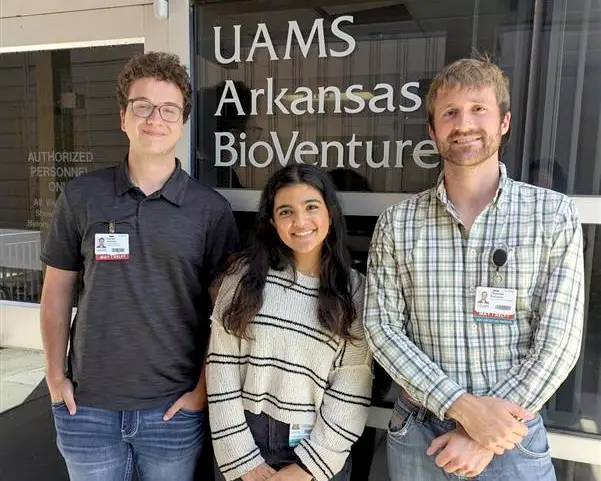
BioVentures’ 2025 interns modernized core data systems and explored how UAMS innovations reach the market, bridging science and business. BioVentures is wrapping up its 2025 Internship Program on August 1, with two standout students who have brought fresh energy and dedication to the office: Carter Horton and Nyera Ali. Carter, a sophomore in Biomedical Engineering and National Merit Scholar at the University of Arkansas, described his experience by saying: “This internship has shown me how science and business connect to improve lives. It’s exciting to see it firsthand.” Nyera, a rising senior at Pulaski Academy, is a Model United Nations standout and one of only seven students from Arkansas selected to compete at the prestigious Regeneron International Science and Engineering Fair for her genome-editing research. Participating through the Summer Research Institute (SRI), she has been working with Dr. Mitch McGill on research involving acetaminophen-induced liver injury. Throughout the summer, both interns have played a role in transferring and organizing key data into a new system, a project that will serve as the foundation for future operations at BioVentures. In doing so, they’ve gained direct exposure to the process of technology transfer and learned how discoveries at UAMS move from the lab into the real world through commercialization. We’re grateful to have had them with us this summer and look forward to seeing where their paths lead next. Interested in interning with BioVentures in 2026? Contact tforcum@uams.edu.
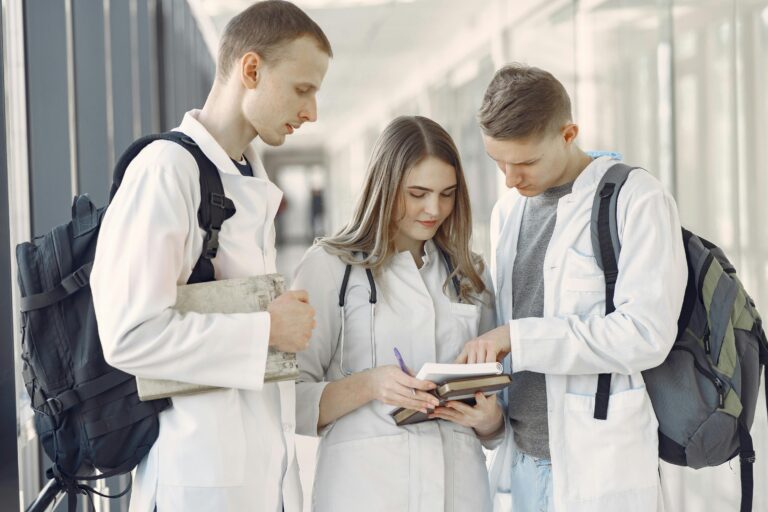
Medicine is changing rapidly in the face of technology and innovation. Today’s medical students must not only keep up with these changes, they should be prepared to take a leading role. Here with a solution is the Medical Innovation and Entrepreneurship Honors Track (MIEHT), available to medical students in the University of Arkansas for Medical Sciences (UAMS) College of Medicine. With progressively intensive training in innovation and entrepreneurship complementing their four years of medical school, these students will learn to approach the clinical environment as problem-solvers and change-makers. John Sherrill, Ph.D., MPH, senior licensing associate at BioVentures and track director for MIEHT, said to imagine the potential impact that entrepreneurially minded physicians could have if they were taught to view healthcare with an eye for innovation from the start. “We train medical students to do needs assessments of patients,” Sherrill said. “But we don’t teach them to do the same type of needs assessment for the larger practice of medicine. While, as a practicing physician, you will impact hundreds of lives, maybe thousands of lives, but if you can make a bigger impact through innovation and entrepreneurship, you have the potential to impact tens of thousands, if not hundreds of thousands of lives.” MIEHT welcomed its first five students this year in the summer after their first year of medical. Through trainings, exercises and guest speakers, they learned basic entrepreneurial principles and began learning how to spot and evaluate problems – a skill that Sherrill hopes they will take with them wherever they go. They were also primed to consider financial benefits to the health system and how to present solutions to administrators. “They’re new to the practice of medicine, which is a great time to introduce these concepts,” Sherrill said. “They haven’t been around long enough to have the attitude, ‘That’s the way we’ve always done it.’ When they see a problem, they’re going to ask, ‘Why?’” By the third and fourth years of their medical training, they will be heading into clinical rotations. MIEHT will teach them to identify real-world problems and perform semi- quantitative analyses. A fourth-year elective rotation will give them the time and support to work on solutions. “It will be student driven,” Sherrill said, noting that the students have diverse interests in everything from device and software development to largescale public health issues. “They can apply the skills they learn in MIEHT to the specific areas they are passionate about.” However, as they put what they learn into practice, Sherrill will advise them to not get too focused on any single solution. Adaptability is a better skill. “It’s all about the problem,” Sherrill said. “I encourage students to fall in love with the problem, not the solution. Once innovators fully understand the problem, they iterate on potential solutions.” A Chancellor’s Circle Grant Award from UAMS provided $10,000 in initial support to launch the program in 2023, including funding for technology and a stipend for the students. Otherwise, the program is funded by in-kind support from BioVentures LLC., the tech transfer office for UAMS. Looking forward, Sherrill hopes to partner with other colleges across campus to offer versions of the program. “We’re educating some of the brightest minds in the state and country every year in our colleges,” Sherrill said. “Why would we not offer this extra skillset to them?” Students will continue to enter the program on a rolling basis. Recruiting for the program will occur around December each year. For more information, contact Sherrill at JSHERRILL@uams.edu.